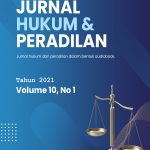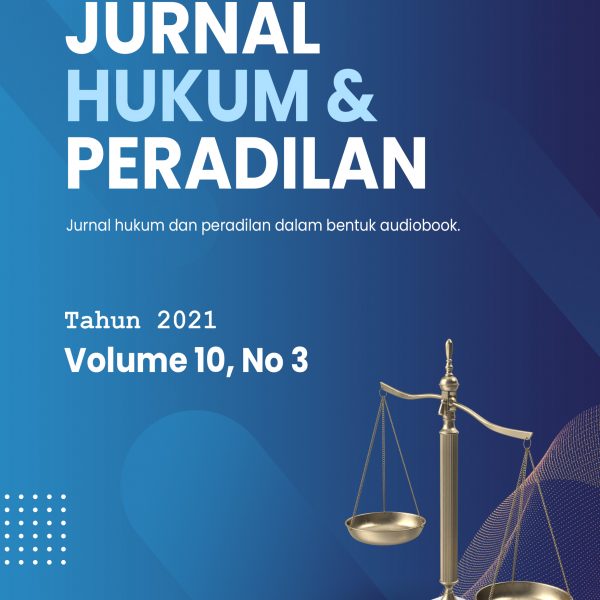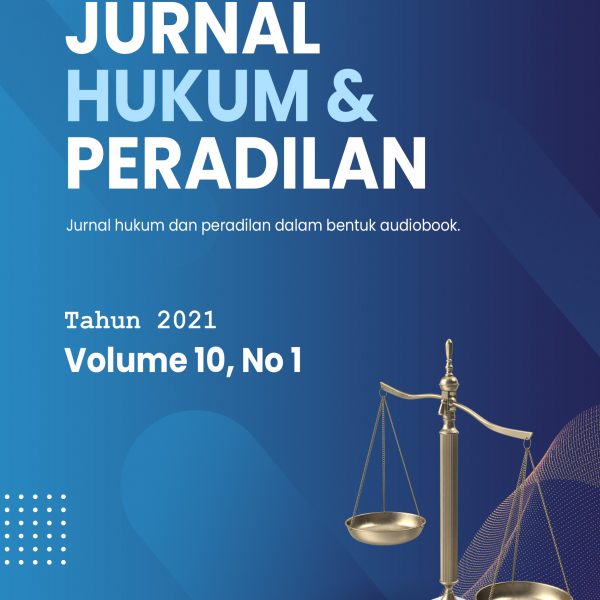
Jurnal Tahun 2021
Volume 10, No 2
Abstract.
The Ratification Act is a legal product that states Indonesia’s commitment to an international treaty. The constitutionality of these laws has been tested before the Constitutional Court. In its decision, the Constitutional Court stated that the Ratification Acts is the object of judicial review as stipulated in article 24 C paragraph (1) of the 1945 Constitution. Even though there were two differences of opinion in the verdict on the ASEAN Charter Ratification Laws review, namely the Justice: Hamdan Zoelva and Maria Farida. The two judges categorized the Laws on the Ratification of International Treaties, not in the category of laws reviewed by the Constitutional Court. This decision explains the position of the Ratification Law in the Indonesian legal system and its future implications. This paper discusses the position of the Ratification Acts under the Indonesian legal system and the implications that will occur after the future Constitutional Court decisions on the development and relations of national law and international law. This writing uses secondary data and also primary, secondary, and tertiary legal material. This writing found the inconsistency of Indonesia in making ratification acts of International Law. It emerges that implication to the status of ratification acts. Moreover, The Constitutional Court decision tries to clarify ratification acts under the Indonesian legal system.
Abstract.
Abstract.
Abstract.
To protect environmental pollution and/or damage, the government has issued legislation on environmental protection and management supplemented by Ministerial Regulations. Environmental pollution and/or damage can occur due to natural factors and human actions that result in losses to the country and/or society. Environmental polluters and/or destroyers can be prosecuted in court. Before environmental disputes are transferred to court, environmental disputes are first resolved through mediation conducted by a mediator and settled out of court (non-litigation) in accordance with applicable laws. Mediators or the role of third-party services are free and neutral /impartial.
Abstract.
Abstract.
Public Service is the embodiment of the main tasks of a governance. But in its implementation sometimes it also causes disputes due to losses experienced by community members due to a bad public service. Therefore Law No. 25 of 2009 concerning Public Services regulates dispute resolution in the implementation of public services. At least there are two types of ways to resolve compensation in public service dispute that caused by Tort in the Public Service, namely the Non-Litigation settlement through the Ombudsman, and the Litigation settlement through the Court. However, in further studies it was found that there was an overlap of authority between the Ombudsman and the Court in resolving public service disputes. This paper will try to discuss this in depth in terms of the philosophy of the existence of the Ombudsman, and its implications for its Special Adjudication authority. Aside from that, this paper will also discusses about the procedure of proceedings in the Administrative Court regarding public service disputes.
Abstract.
Abstrak.
Kajian ini bertujuan untuk menelusuri kontradiksi pengaturan hukuman dalam tindak pidana pelecehan seksual terhadap anak di Aceh pasca diberlakukannya Qanun No. 6 Tahun 2014. Pengaturan hukuman pelecehan seksual terhadap anak dalam hukum jinayat di Aceh mempunyai perbedaan penafsiran dengan peraturan perundang-undangan lainnya termasuk UU No. 35 Tahun 2014 tentang Perlindungan Anak. Sehingga esensi efek jera bagi pelaku yang seharusnya menjadi bagian tujuan pemidanaan tidak begitu tercapai. Selain itu, Qanun Jinayat juga berpotensi untuk terjadinya impunitas bagi pemerintah dengan adanya Pasal 9 dan Pasal 11 Qanun No. 6 Tahun 2014 mengenai alasan pembenaran serta alasan pemaaf. Metode yang digunakan dalam tulisan ini yaitu metode yuridis normatif, dengan menggunakan data sekunder atau data kepustakaan.






